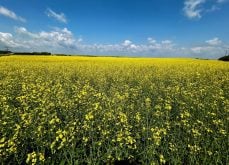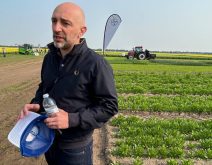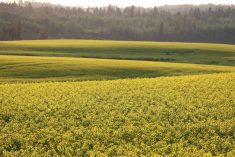The crop could be a good fit in Western Canada because of its short maturity and low water requirements
SASKATOON — Camelina is poised for takeoff as the renewable diesel and sustainable aviation fuel industries grow, says a promoter of the crop.
Mike Karst, senior vice-president of Global Clean Energy and president of its subsidiary Sustainable Oils, has been promoting the oilseed since 2007.
There have been many momentum ebbs and flows during that time, but he thinks the crop is finally on the runway and ready for liftoff.
“There has been an awful lot of press releases about camelina,” he said.
Some of those have been issued by Global Clean Energy, which claims to be the world leader in camelina production.
Read Also

Alberta crop diversification centres receive funding
$5.2 million of provincial funding pumped into crop diversity research centres
Farmers in the western United States, Argentina, France and Spain grew 65,000 acres of the company’s patented varieties in 2023.
It hopes to double that amount in 2024, taking a baby-step approach to market development.
“We’re not promising ginormous, huge, fantastical numbers of production next year because we have to be able to support and service all those people,” said Karst.
But the U.S. firm has big plans for the crop.
“I will be very disappointed if we’re not in the millions of acres within 10 years globally,” he said.
Most current acres are in the U.S. market where the firm is converting a crude oil refinery in Bakersfield, California, into a renewable diesel plant capable of producing 800 million litres of the fuel per year.
But the company is also eyeing up Canada, where it attempted to conduct field trials last year.
“Due to some unfortunate weather conditions that you had north of the border, some of those plots didn’t get planted,” said Karst.
“We’re going to have to repeat a lot of that work.”
The company needs at least two years of successful field trial data before proceeding with commercialization in Canada.
He thinks the crop will be a fit in Western Canada because of its short maturity and low water requirements. Growers can get a good crop with 150 to 250 millimetres of annual precipitation and a great one with 250 to 380 mm.
The trick will be finding niche production areas for the crop, which is grown on the same acres as wheat and canola.
“Our company philosophy is we’re not going to displace a food crop,” said Karst.
“That goes against the whole idea of us trying to be a low carbon intensity producer of feedstocks for the renewable fuels industry.”
It might have to be grown in the fringe areas of canola production where yields are disappointing or in place of summerfallow fields.
Sustainable Oils will only promote the crop in areas where there is a good agronomic fit and access to a nearby crush plant or grain elevator with good rail service.
“You’ll know before you sign a contract where it’s going to go,” said Karst.
Global Clean Energy acquired Spanish competitor Camelina Company in 2022. Together, the two companies own 20 patented spring and winter varieties of the crop and have over 25,000 genotypes in their collection.
The patented varieties are commercially available in North America through Sustainable Oils and in South America and Europe through Camelina Company.
One of the newest varieties has confirmed resistance to imazamox and imazethapyr, the active ingredients in BASF’s Beyond and Pursuit Group 2 herbicides.
The company has also identified varieties with tolerance to Group 14 PPO herbicides, such as sulfentrazone, which is in FMC Corporation’s Spartan and Corteva Agriscience’s Sonic herbicides.
Competitors include Smart Earth Camelina, Vision Bioenergy Oilseeds and Yield 10 Bioscience.
















